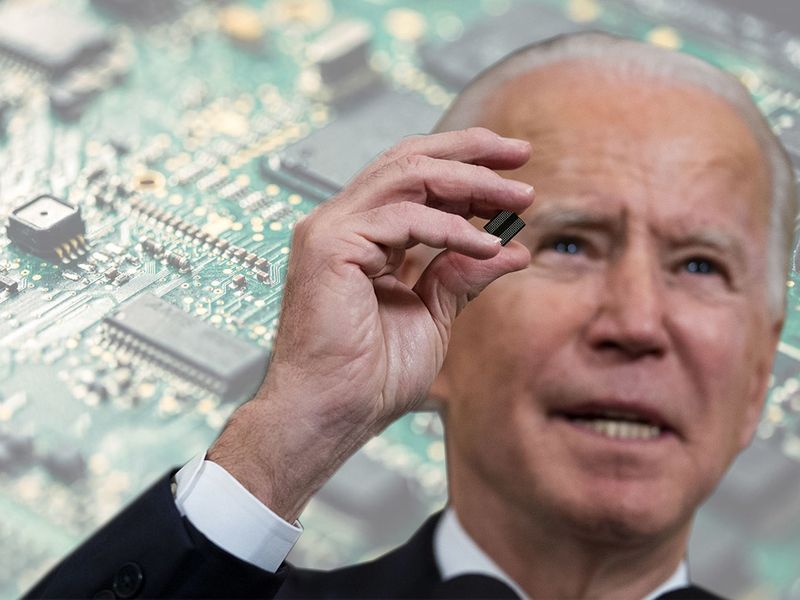
WASHINGTON — President Joe Biden told companies vying with each other for a sharply constrained global supply of semiconductors that he has bipartisan support for government funding to address a shortage that has idled automakers worldwide.
During a White House meeting with CEOs on Monday, Biden read from a letter from 23 senators and 42 House members backing his proposal for $50 billion for semiconductor manufacturing and research.
“Both sides of the aisle are strongly supportive of what we’re proposing and where I think we can really get things done for the American people,” Biden said. “Now let me quote from the letter. It says, ‘The Chinese Communist Party is aggressively — plans to reorient and dominate the semiconductor supply chain,’ and it goes into how much money will be they’re pouring into being able to do that.”
More than a dozen CEOs, including General Motors CEO Mary Barra, Ford Motor Co. CEO Jim Farley and Stellantis CEO Carlos Tavares participated in the virtual summit.
“This isn’t a meeting where we expect a decision or an announcement to come out of,” White House Press Secretary Jen Psaki said Monday. But she said the meeting shows the administration is serious about addressing supply-chain constraints and softening the blow for affected companies and workers.
National Economic Council director Brian Deese and National Security Adviser Jake Sullivan hosted the meeting, with Commerce Secretary Gina Raimondo also participating. Companies invited to join the administration officials included Dell Technologies Inc., Intel Corp., Medtronic Plc, Northrop Grumman Corp., HP Inc., Cummins Inc., Micron Technology Inc., Taiwan Semiconductor Manufacturing Co., AT&T Inc. and Samsung Electronics Co., as well as GM, Ford and Alphabet Inc.
The administration officials intended to highlight elements of the president’s proposed $2.25 trillion infrastructure plan that they believe would improve supply chain resilience, a White House official said. The agenda also included discussions about the auto industry’s transition to clean energy, job creation and ensuring U.S. economic competitiveness, the official added.
Many of the lawmakers supporting additional funding for semiconductors want to see the measure in a bill related to China, not as part of Biden’s infrastructure package, as it is now.
But exactly how to spend and allocate the semiconductor funding is a source of debate among automakers and other consumers of chips, as well as the semiconductor companies themselves.
Carmakers are pushing for a portion of the money to be reserved for vehicle-grade chips, warning of a potential 1.3 million shortfall in car and light-duty truck production in the U.S. this year if their industry isn’t given priority.
Yet makers of other electronic devices affected by the chip shortage, such as computers and mobile phones, have taken issue with the carmakers’ demands, worried their industries will suffer. The debate could be a factor in the White House meeting.
The White House has not taken a public position on the issue but has indicated privately to semiconductor industry leaders that it would not support special treatment for one industry, according to people familiar with the matter.
Matt Blunt, president of the American Automotive Policy Council, which lobbies for Ford, GM and Stellantis, expressed optimism that the Biden administration would at least consider his industry’s arguments.
He said the White House has not endorsed any specific plans for setting aside money for carmakers, but administration officials “understand why the proposal was made.”
“We hope in the meeting, whoever is gathered there will get an understanding of how we get to where we are fulfilling 100% of orders and provide a road map of what that looks like,” he said.
To avoid future chip shortages, Blunt’s group proposed that at least 25 percent of any federal support for the construction of semiconductor factories must go to U.S. facilities that commit to allocating at least 25 percent of their capacity to automotive-grade chips.
John Neuffer, CEO of the Semiconductor Industry Association, said the industry understands “the difficulty the auto sector is feeling right now, and chipmakers are working hard to ramp up production to meet demand in the short term.”
For the long term, he said, the industry needs a boost in domestic production and innovation across the board “so all sectors of our economy have access to the chips they need, and that requires swiftly enacting federal investments in semiconductor manufacturing and research.”